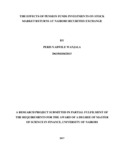| dc.contributor.author | Wanjala, Peris N | |
| dc.date.accessioned | 2018-01-31T12:50:06Z | |
| dc.date.available | 2018-01-31T12:50:06Z | |
| dc.date.issued | 2017 | |
| dc.identifier.uri | http://hdl.handle.net/11295/103031 | |
| dc.description.abstract | Pension Funds are among the major institutions that invest in Kenya and all over the world. Pension fund investments provide long-term financing to domestic markets and governments as pension savings are long-term (Raddatz & Schmukler, 2008). They are therefore a significant source of stable and long term capital on the NSE. They also improve the liquidity of the assets traded on the NSE as they invest huge amounts in assets that can be liquidated with much ease such as deposits held with banks, government bonds and other short-term instruments. This study sought to determine the effect of pension fund investments on stock market returns at the NSEThe population for the study was all the 1,297 registered schemes in Kenya while the sample size for the study comprised 130 pension schemes. The independent variables were amount of pension funds invested in stocks, size of pension funds as measured by fund value and level of economic development as measured by change in GDP. Stock market returns at the NSE was the dependent variable which the study sought to explain and it was measured by change in NSE 20 share index. Secondary data was collected for a period of 5 years (2012 to 2016) on an annual basis. The study employed a descriptive and a survey research design and a multiple linear regression model was used to analyze the relationship between the variables. Statistical package for social sciences version 21 was used for data analysis purposes. The results of the study produced R-square value of 0.365 which means that about 36.5percent of the variation in stock market returns atthe NSE can be explained by the selected independent variables while 63.5 percent in the variation was associated with other factors not covered in this research. The study also found that the independent variables had a strong correlation with stock market returns at the NSE. ANOVA results show that the F statistic was significant at 5% level with a p=0.000 which was less than 0.05. Therefore the model was fit to explain stock market returns at the NSE. The results further revealed that individually, level of economic development is a significant determiner of stock market returns at the NSE while pension fund investments in stocks and pension fund size were found to be statistically insignificant determiners of stock market returns at the NSE. This study recommends that policy makers should work on improving the prevailing levels of economic development as this will impact on stock market returns at the NSE leading to increased shareholders’ wealth. | en_US |
| dc.language.iso | en | en_US |
| dc.publisher | University of Nairobi | en_US |
| dc.rights | Attribution-NonCommercial-NoDerivs 3.0 United States | * |
| dc.rights.uri | http://creativecommons.org/licenses/by-nc-nd/3.0/us/ | * |
| dc.subject | Pension Funds Investments on Stock Market Returns | en_US |
| dc.title | The Effects of Pension Funds Investments on Stock Market Returns at Nairobi Securities Exchange | en_US |
| dc.type | Thesis | en_US |



